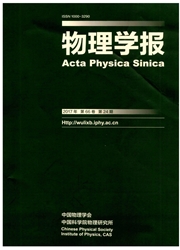

 中文摘要:
中文摘要:
本文,基于经典统计光学,建立符合热光特性的统计模型,通过数值模拟证明了吴令安和Meyers提出的图像重构算法,并进行了定性的理论分析.在关联成像获得的数据样本中,根据桶探测器的光强涨落进行分组,分别以某个阈值作为下限和上限,再将分组后的独立样本和相应的面探测器信号进行强度关联,则可以得到物体的正像或负像.然而,不经过关联运算,直接对分组后的面探测器信号进行算数平均也可以得到物体的正像或负像,同时成像的对比度得到较大提高.这种分组对应的非定域成像进一步说明强度涨落在热光成像中的重要性.最后以字符掩膜版作为成像物体,分别运用关联成像和分组对应正负成像算法重构物体的图像,实验结果证明这种新的正负算法可以提高非定域成像的对比度.
 英文摘要:
英文摘要:
Based on correlated imaging with pseudo-thermal light, Wu and Meyers independently experimentally showed that both positive and negative images can be obtained by using a novel algorithm. With the theory of statistical optics, we construct the model of thermal light, and demonstrate the novel algorithm for image reconstruction. To deal with the data attained in the correlated imaging, we reorder the intensity recorded by the bucket detector according to the value of fluctuation. For a given fluctuation range with all the records above or below a specific value, we can obtain either positive or negative images by calculate the correlation between the selected records of the bucket detector and the reference detector. Nevertheless, without correlated calculations, positive or negative images can be also produced by directly averaging the corresponding records of the reference detector with positive or negative fluctuations. Meanwhile, the visibility of imaging is greatly enhanced. This correspondence imaging method further demonstrates the importance of intensity fluctuations in the nonlocal imaging with thermal light. We also experimentally show the images that obtained by the correlation method and the positive-negative correspondence imaging method, respectively. Our results indicate that this novel algorithm has a better visibility than that of the conventional correlated imaging.
 同期刊论文项目
同期刊论文项目
 同项目期刊论文
同项目期刊论文
 Performance analysis of compressive ghostimaging based on different signal reconstruction techniques
Performance analysis of compressive ghostimaging based on different signal reconstruction techniques Frequency indistinguishibility investigation of generated coincident-frequency entanglement via ultr
Frequency indistinguishibility investigation of generated coincident-frequency entanglement via ultr The factors of spontaneous parametric down conversion process in BiB3O6 crystal with a broadband pum
The factors of spontaneous parametric down conversion process in BiB3O6 crystal with a broadband pum Theoretical and experimental study on methods for increasing squeezed level in the generation of squ
Theoretical and experimental study on methods for increasing squeezed level in the generation of squ 期刊信息
期刊信息
